The East Asian Society for the Scientific Study of Religion’s 4th annual meeting featured a session on “New Religious Movements in Taiwan.”
by Daniela Bovolenta
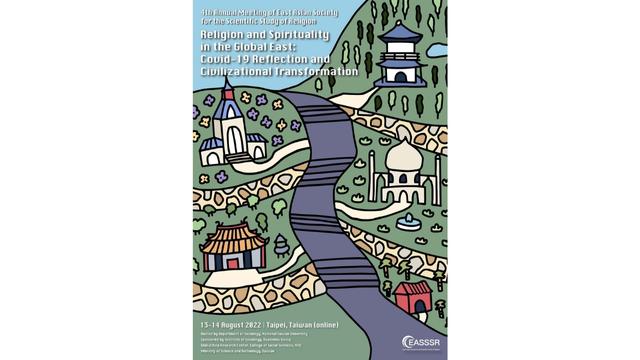
On 13 and 14 August 2022, the Department of Sociology of National Taiwan University hosted in Taipei the 4th annual meeting of EASSSR, the East Asian Society for the Scientific Study of Religion. The meeting was delayed due to COVID-19, and finally took place online. It explored “Religion and Spirituality in the Global East: COVID-19 Reflection and Civilizational Transformation.”
Session 12 on August 13 was devoted to “New Religious Movements in Taiwan,” and focused on different aspects of Tai Ji Men and the Tai Ji Men case within the broader political and religious context of Taiwan. Massimo Introvigne, an Italian sociologist and the managing director of CESNUR (Center for Studies on New Religions), introduced the session where he also presented a paper.
Tsai Cheng-An, an associate professor at Taiwan’s Shih Chien University, explored the relationship between COVID-19 and spirituality, a main theme of the EASSSR conference. While COVID-19 causes different types of individual and social distress, Tsai said, it also provides an opportunity to reflect on transcendent life, as many seek comfort in religion and spirituality. Tsai then discussed how Tai Ji Men reacted to the COVID-19 crisis.
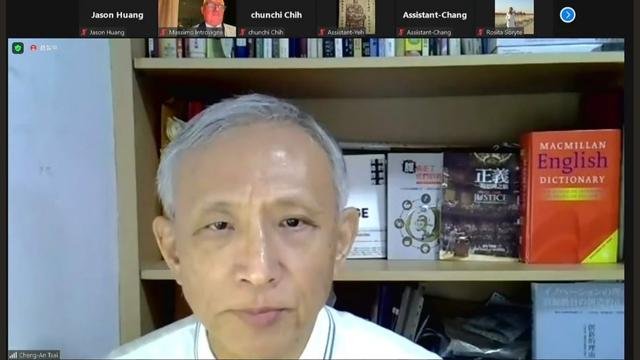
This reaction, Tsai explained, is rooted in Tai Ji Men’s approach to “integral ecology.” The notion of “integral ecology” is at the center of Pope Francis’ 2015 encyclical letter “Laudato si’.” Tsai found this holistic ecology, which cares at the same time for the environment, human culture, and social justice at work also within Tai Ji Men.
He reviewed several international initiatives and declarations promoted by the Shifu (Grand Master) of Tai Ji Men, Dr. Hong Tao-Tze, including the Movement of an Era of Conscience, the invitation to world leaders to ring the Bell of World Peace and Love, the attendance at United Nations gatherings, the successful promotion of April 5 as the International Day of Conscience, recognized in 2019 as a United Nations day of observance, and the tours bringing Tai Ji Men dizi (disciples) to all continents for performances and events promoting a culture of love, peace, and conscience, whose roots are in the ancient idea of the harmony of Yin and Yang.
Tsai connected Tai Ji Men’s “campaign for conscience” with its benevolent activities in times of epidemics, which started when SARS hit Taiwan in 2003 and were acknowledged by local authorities. During the COVID-19 crisis, Tai Ji Men insisted that “the best vaccine is conscience.” Tai Ji Men supported the efforts of the health authorities and offered common sense suggestions and tips through publications and animated videos.
On the other hand, Dr. Hong insisted that creating positive energy, turning to the conscience, and performing good deeds also helps boosting physical and psychological immunity. For this reason, Tsai concluded, Tai Ji Men continued to be active, as far as restriction allowed and notwithstanding the continuing harassment through the tax case, in its campaigns promoting conscience and peace internationally even during the years of the COVID crisis.
The full video of the session New Religious Movements in Taiwan
Chih Chun-Chi, a research fellow at the Higher Education and Accreditation Council of Taiwan, explored Tai Ji Men’s practice of Heart Kung Fu in connection with the international philosophical discussion on the concept of altruism, and the works of philosopher Thomas Nagel and political scientist Kristen Renwick Moore. Altruism has emerged as a key concept in philosophy, ethics, and psychology. Several scholars, Chih said, have noted that altruism can only be effective if it is an attitude of the heart, while a purely intellectual approach would likely result in empty talk only.
The heart as the center of the whole human being, Chih observed, is also a traditional concept of Taoism. Tai Ji Men teaches that we need to reform our heart and turn to conscience. Without changing our heart first, altruism is impossible. Tai Ji Men’s Heart Kung Fu, Chih explained, works through three stages. First, we should change our heart and put conscience at the center. Second, we may spread the message of love and conscience to others, in words and deeds, which corresponds to the contemporary definitions of altruism. Third, we become capable of extending altruism to the whole world.
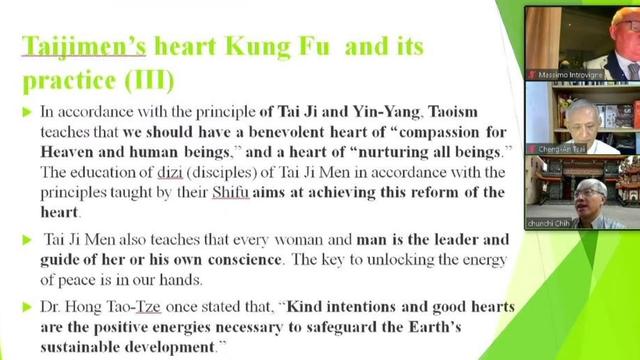
Chih concluded by noting that within Tai Ji Men the altruistic program of Heart Kung Fu is not theory only. It became a practical program through the international Movement of an Era of Conscience and the promotion of the International Day of Conscience. Heart Kung Fu also inspired the reaction of Tai Ji Men dizi to the injustices vested on them in Taiwan. Dizi came to realize that what happened to them was part of a larger problem of tax injustice in Taiwan. Rather than focusing on their own case only, they altruistically extended their compassion to other victims of tax abuses, and promoted a national movement for tax and legal reform.
Massimo Introvigne presented a paper on the notion of “xie jiao,” a Chinese expression commonly translated as “cults.” On the one hand, Introvigne said, the translation is inaccurate and anachronistic because “xie jiao” has been used in China since the 7th century CE to designate “heterodox teachings” accused of not supporting the governments and recruit followers through the use of black magic. On the other hand, “xie jiao” is used as a label to stigmatize and discriminate against certain minorities, and in this sense it performs a similar function with respect to the word “cult” in the West.
While there is a significant literature on the use of “xie jiao” in Imperial China and in the contemporary People’s Republic, where being active in a “xie jiao” is a crime punished by the Criminal Code, Introvigne noted that not much attention has been paid to the fact that the same category has also been used in Taiwan, both during the Martial Law era and beyond. Introvigne offered a short history of the persecution of groups labeled as “xie jiao” in Taiwan from the first years of the Martial Law to the politically motivated crackdown of 1996 against religious and spiritual movements accused of not having supported the candidate of the ruling party that eventually won that year’s presidential election.
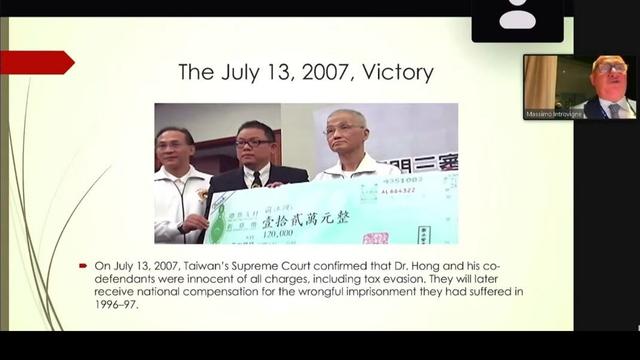
Introvigne then proceeded to present a chronological summary of the case of Tai Ji Men, which was among the victims of the 1996 crackdown even if it had not taken a political position in the election. The presentation showed how Tai Ji Men won the criminal case but continued to be harassed through ill-founded tax bills until, based on one of the bills, sacred land intended for a self-cultivation center was seized, unsuccessfully auctioned off, and confiscated in 2020, generating massive street protests.
Within the broader context of the discrimination of minorities as “xie jiao” in Taiwan, Introvigne concluded by noting that the legal and tax persecution of Tai Ji Men was always accompanied by media slander and the use of discriminatory language and labels.
Rosita Šorytė, a former diplomat and a member of the Scientific Committee of the European Federation for Freedom of Belief (FOB), discussed the issue of transitional justice in Eastern Europe and Taiwan. She started by mentioning an art exhibition currently taking place in Kaunas, Lithuania, of works of the South African artist William Kentridge, whose grandparents were Lithuanian. Kentridge’s work has at its core a reflection on the successes and limits of transitional justice in South Africa after the apartheid.
Transitional justice, Šorytė explained, as a concept developed in United Nations documents, applies to situation of transitions from a non-democratic to a democratic regime and has four dimensions: restoring justice to those whose human rights had been violated; punishing the perpetrators; telling the truth to citizens about what happened; and preventing the abuses from taking place again—something that can also happen in democratic times.
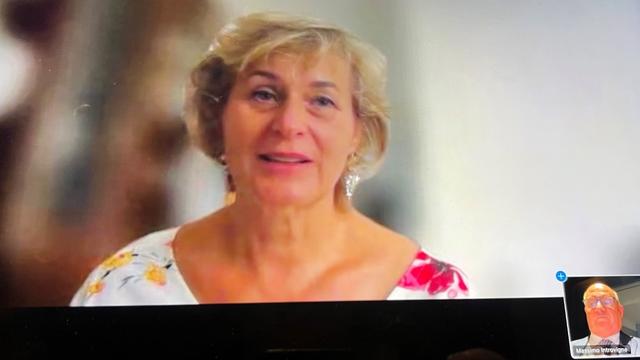
Šorytė quoted cases about Lithuania to illustrate how the application of transitional justice in Eastern Europe after the fall of Communist regimes was not easy, for both political and legal reasons. The European Court of Human Rights examined various cases and played a guiding role in establishing the principles of post-Communist transitional justice.
Unlike in Europe, in Taiwan cases cannot be brought to the attention of a court operating at a supra-national level such as the ECHR, Šorytė noted. However, there are lessons Taiwan can learn from the Eastern European experience, she said. One is that freedom of religion or belief is an important part of transitional justice and should not be overlooked.
Another, emphasized in the work of William Kentridge, is that commissions and laws are only part of the solution. Ultimately, transitional justice requires a change of heart and a turn to conscience. Šorytė concluded by referring to the other papers in the session by noting that these principles are at the core of the spirituality of Tai Ji Men. They should also help solving the Tai Ji Men case.
Source: Bitter Winter

